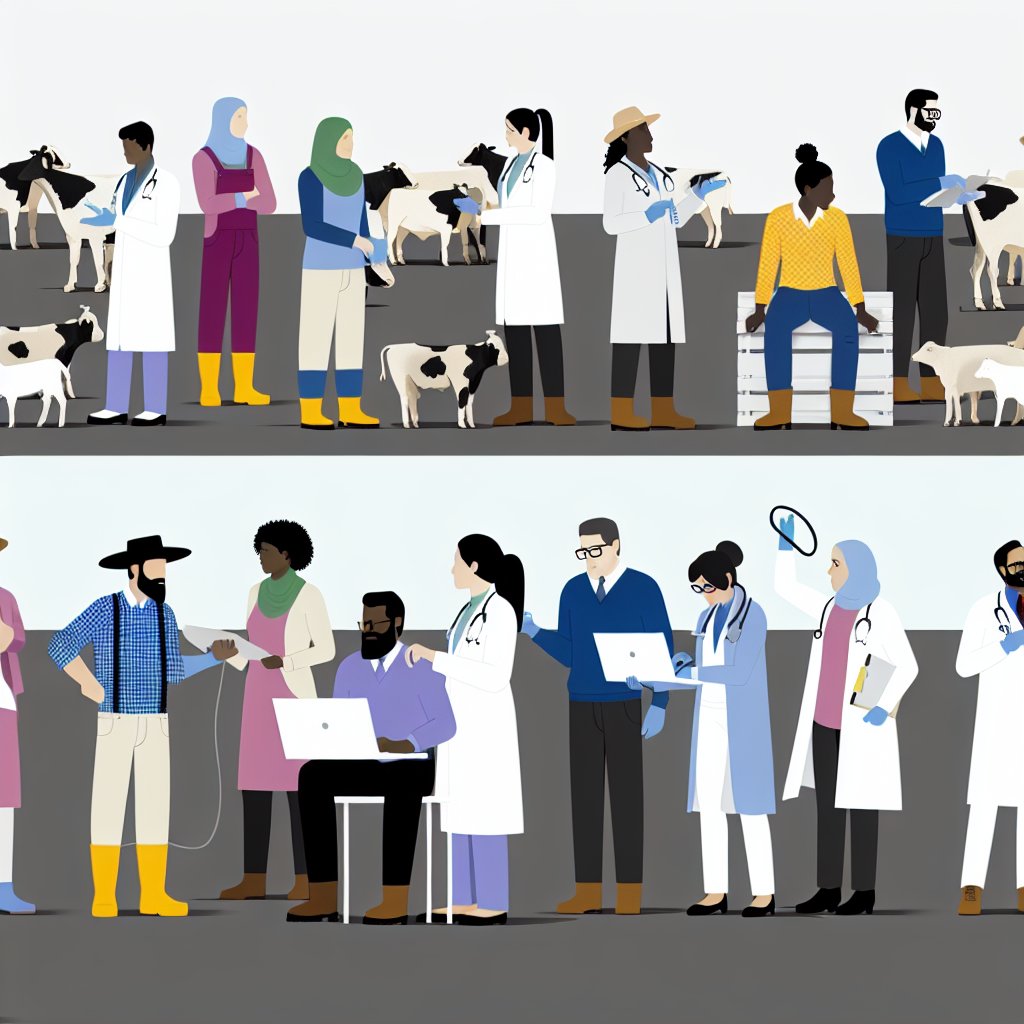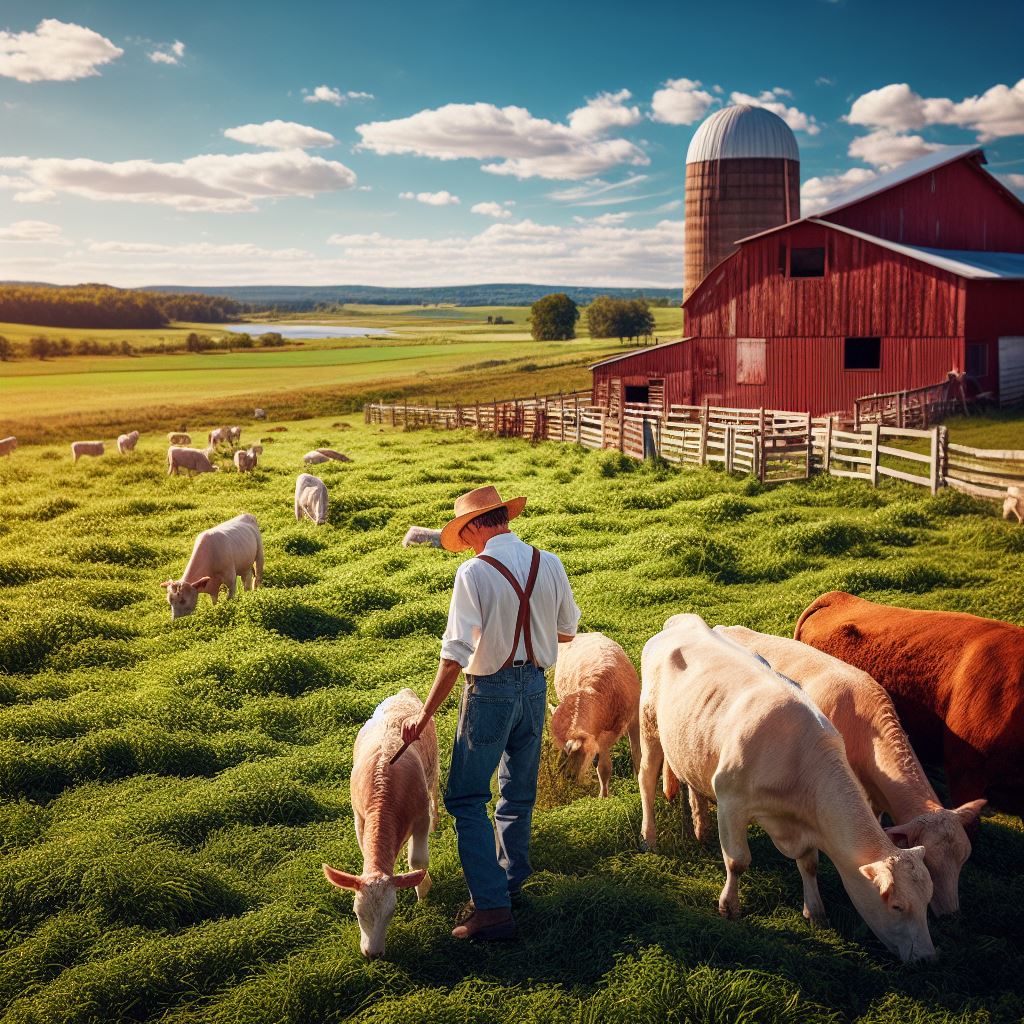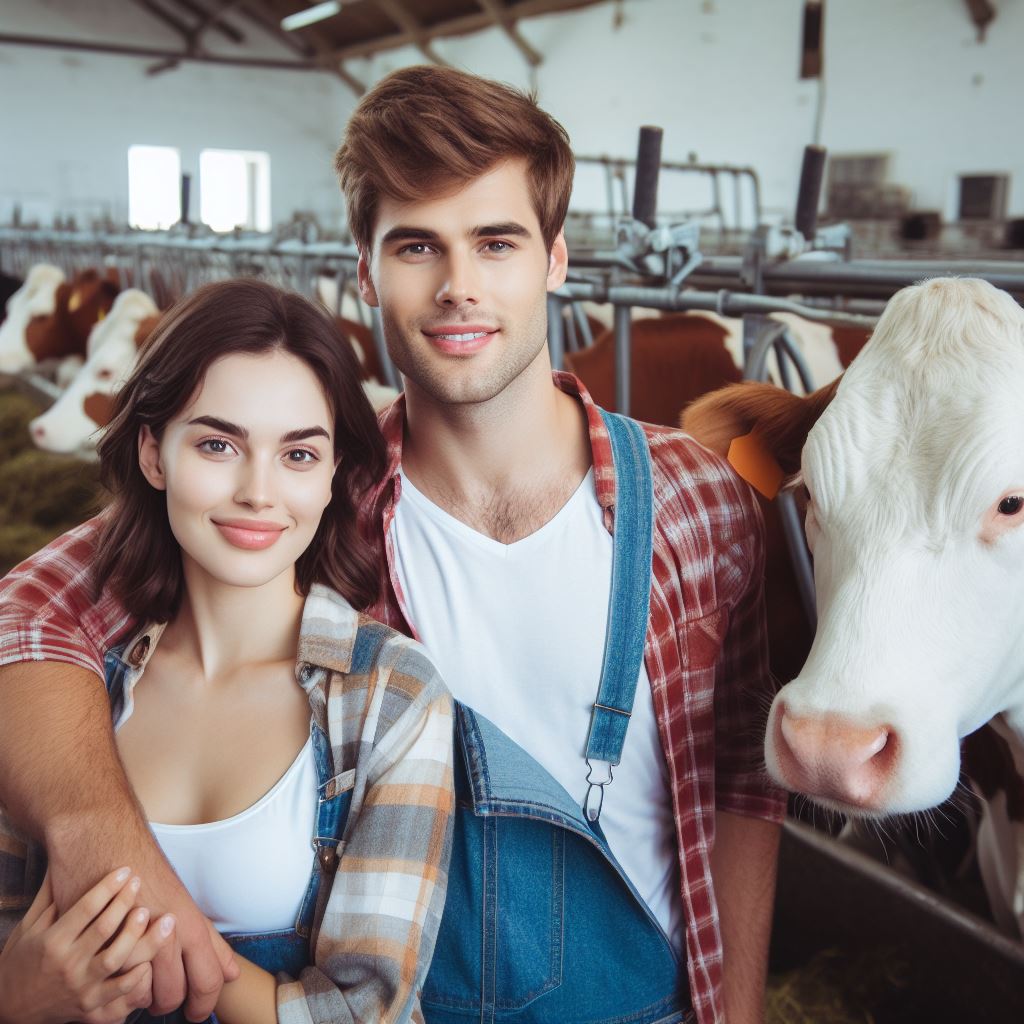Introduction to Vaccination in Livestock
Vaccination plays a crucial role in livestock health management.
It helps prevent the outbreak of diseases among animals.
Proper vaccination schedules ensure animals are protected at the right times.
This preventive measure reduces the need for antibiotics and other treatments.
Consequently, it promotes healthier livestock and safer food supplies.
Importance of Vaccination in Disease Prevention
Vaccination helps to develop immunity against infectious diseases.
Healthy livestock enhances productivity and farm profitability.
A well-vaccinated herd lowers the risk of disease outbreaks.
This proactive approach saves farmers money on veterinary care.
Moreover, it supports animal welfare and ethical farming practices.
Overview of Vaccination Schedules
Vaccination schedules outline the timing and types of vaccines needed.
These schedules vary based on species and specific health risks.
For instance, young animals often receive vaccines that target common diseases.
As livestock mature, they may need booster shots to maintain immunity.
Farmers should consult veterinary experts to tailor schedules for their herds.
Transform Your Agribusiness
Unlock your farm's potential with expert advice tailored to your needs. Get actionable steps that drive real results.
Get StartedFactors Influencing Vaccination Timing
Several factors influence the timing of vaccinations.
Age of the animal is a primary consideration.
Young animals need vaccinations before they are exposed to diseases.
Seasonal disease outbreaks also guide vaccination timing.
Additionally, local regulations may dictate specific vaccine requirements.
Understanding Livestock Diseases and Their Impact on Farming
Overview of Common Livestock Diseases
Livestock diseases pose significant challenges to farmers.
Common diseases include bovine respiratory disease and swine flu.
These diseases can affect animal health and productivity.
Moreover, they can lead to significant economic losses for farmers.
Transmission and Spread of Livestock Diseases
Diseases often spread through several modes, including direct contact.
Environmental factors also play a crucial role in disease transmission.
Inadequate biosecurity measures can exacerbate the spread.
This makes it crucial for farmers to remain vigilant.
Economic Impact on Farming Operations
Livestock diseases can drastically reduce herd productivity.
Infected animals may require extensive veterinary care.
This creates additional costs for farmers.
Consequently, farmers face reduced profits and increased operational expenses.
Psychological Effects on Farmers
Coping with livestock diseases can be stressful for farmers.
Many experience anxiety over potential losses.
This stress can affect their decision-making abilities.
Farmers need support to manage these psychological challenges.
Preventative Measures Against Livestock Diseases
Implementing veterinary health plans is essential.
Regular vaccination schedules significantly reduce disease risk.
Farmers should also maintain strict biosecurity protocols.
Showcase Your Farming Business
Publish your professional farming services profile on our blog for a one-time fee of $200 and reach a dedicated audience of farmers and agribusiness owners.
Publish Your ProfileIdentifying and isolating sick animals quickly can prevent outbreaks.
How Vaccination Schedules Are Developed for Different Livestock Species
Understanding the Species-Specific Needs
Each livestock species has unique immunological characteristics.
Vaccination schedules must reflect these differences effectively.
Cattle, for example, require different vaccines compared to poultry.
Furthermore, timing and frequency play crucial roles in their health.
Consultation with Veterinary Experts
Veterinarians provide essential insights based on current research.
Their expertise helps in creating tailored vaccination protocols.
Moreover, veterinarians consider the specific diseases prevalent in different regions.
This ensures that the vaccines used are effective and relevant.
Reviewing Existing Guidelines and Research
Organizations such as the World Organisation for Animal Health contribute valuable information.
Researchers conduct studies that inform best practices in vaccination.
These resources guide farmers in developing their vaccination schedules.
Consequently, staying updated is critical for effective disease prevention.
Monitoring Disease Outbreaks
Active monitoring of livestock health trends informs vaccination strategies.
Farmers should track cases of diseases in their herds or flocks.
This data helps in adjusting vaccination protocols as needed.
Additionally, early detection of disease outbreaks can lead to quick responses.
Adapting to Environmental Factors
Environmental factors can impact the efficacy of vaccines.
For instance, temperature and humidity levels affect vaccine stability.
Farmers must consider local climate conditions in their schedules.
These adaptations enhance the overall effectiveness of immunization efforts.
Discover More: Poultry Management for Antibiotic-Free Farming
The Role of Timing in Vaccination: Key Factors and Best Practices
Importance of Proper Timing in Vaccination
Timing plays a crucial role in the effectiveness of vaccinations for livestock.
Properly timed vaccinations can significantly reduce disease outbreaks.
Different age groups require different vaccination schedules.
For example, young animals often need earlier vaccinations.
Key Factors Influencing Vaccination Timing
Several factors impact the timing of vaccinations.
Animal age is a primary consideration.
The specific disease risk in the region influences timing.
Additionally, the overall health status of the animal matters.
Stress from transport or environmental changes can alter vaccination schedules.
Best Practices for Vaccination Schedules
Adhering to best practices ensures optimal vaccination outcomes.
Establish a vaccination calendar tailored to your livestock type.
Consult with veterinarians to adjust schedules as necessary.
Regularly monitor herd health to identify any changes in disease exposure.
Document vaccinations accurately to track compliance and effectiveness.
Benefits of a Proper Vaccination Schedule
A well-planned vaccination schedule provides numerous advantages.
It enhances overall herd immunity and reduces the incidence of diseases.
It can lower veterinary costs by preventing disease outbreaks.
Additionally, it supports better growth rates and production levels in livestock.
Showcase Your Farming Business
Publish your professional farming services profile on our blog for a one-time fee of $200 and reach a dedicated audience of farmers and agribusiness owners.
Publish Your ProfileCommon Vaccination Mistakes to Avoid
Several mistakes can hinder the success of vaccination schedules.
Failing to vaccinate at the recommended age can expose animals to diseases.
Inconsistent vaccination records may lead to misunderstandings.
Vaccinating sick animals can be counterproductive.
Not adjusting schedules based on changing risk factors can undermine effectiveness.
Find Out More: Dairy Cattle Hoof Care for Preventing Lameness Issues
Evaluating the Effectiveness of Vaccination in Disease Prevention
Understanding Vaccination Benefits
Vaccination plays a crucial role in livestock health management.
It helps reduce the incidence of infectious diseases significantly.
Moreover, effective vaccination schedules can enhance overall herd productivity.
Healthy livestock leads to better yields for farmers.
In essence, vaccination safeguards both animal welfare and agricultural economy.
Key Factors Influencing Effectiveness
Several elements affect vaccination outcomes in livestock.
The timing of vaccinations is essential for optimum immune response.
Also, the compatibility of vaccines with livestock species needs consideration.
Additionally, proper handling and storage of vaccines are crucial.
Any lapse in these areas can compromise vaccine effectiveness.
Measuring Vaccination Success
Evaluating vaccine success involves monitoring several health indicators.
Livestock disease incidence rates serve as a primary metric.
Moreover, overall herd productivity rates can highlight vaccination impact.
Farmers can also assess weight gain and milk production levels.
All these factors together indicate the effectiveness of vaccination programs.
Challenges in Implementation
Implementing effective vaccination schedules faces various challenges.
Cost can be a significant barrier for many farmers.
Additionally, misinformation about vaccination can hinder compliance.
Logistical issues, such as transportation and storage, also pose problems.
Consequently, educating farmers on the importance of vaccination is vital.
Future Directions for Vaccination Practices
Innovations in vaccine technology promise improved outcomes.
For instance, developing vaccines with broader applications can be beneficial.
Furthermore, integrating vaccination data with herd management systems enhances planning.
This approach allows for customized vaccination schedules tailored to specific herds.
Ultimately, ongoing research and adaptation will strengthen vaccination practices.
Delve into the Subject: Poultry Management for Profitable Egg Farming
Common Vaccines Used in Livestock
Bovine Vaccines
Bovine vaccines protect against several diseases.
For instance, the vaccines for brucellosis and leptospirosis are vital.
These vaccines enhance cattle health and productivity.
Moreover, they prevent severe economic losses due to disease outbreaks.
Regular vaccination schedules are crucial for herd immunity.
Swine Vaccines
Swine vaccinations target diseases like porcine reproductive and respiratory syndrome (PRRS).
These vaccines significantly reduce mortality rates in piglets.
Additionally, they improve overall herd performance.
Showcase Your Farming Business
Publish your professional farming services profile on our blog for a one-time fee of $200 and reach a dedicated audience of farmers and agribusiness owners.
Publish Your ProfileImplementing a comprehensive vaccination strategy safeguards pig health.
Producers should follow recommended timelines for optimal results.
Poultry Vaccines
Poultry vaccines address common viral and bacterial infections.
Such vaccines include those for avian influenza and Newcastle disease.
Vaccination minimizes the risk of widespread outbreaks in flocks.
Furthermore, these vaccines boost the resilience of poultry against infections.
Establishing a vaccination program is essential for commercial success.
Equine Vaccines
Equine vaccines protect horses from multiple illnesses.
Important vaccines include those for West Nile virus and rabies.
Effectively vaccinating horses helps maintain equine health in stables.
Moreover, it fosters safe interactions in equestrian activities.
Routine vaccination schedules are vital for protecting against seasonal outbreaks.
Small Ruminant Vaccines
Vaccines for sheep and goats help combat diseases like clostridial infections.
These vaccines ensure the safety and health of small ruminants.
Moreover, they play a role in supporting the local agricultural economy.
Regular vaccinations can prevent animal welfare issues.
Farmers should adhere to established vaccination protocols for best practices.
See Related Content: Beekeeping Regulations for Commercial Apiaries

Challenges in Implementing Proper Vaccination Schedules
Awareness and Education
A lack of awareness significantly hampers vaccination efforts among livestock owners.
Many farmers do not fully understand the importance of vaccines.
Educational programs are crucial for conveying effective vaccination practices.
In addition, misinformation can lead to skepticism about vaccines.
Farmers must receive clear guidance based on scientific evidence.
Financial Constraints
Financial limitations often pose significant challenges to vaccination programs.
Many farmers operate on tight budgets and prioritize other expenses.
Vaccination costs can be a barrier, especially in smaller operations.
Government subsidies could help alleviate some financial pressures.
Moreover, investing in vaccines can yield long-term savings by preventing disease outbreaks.
Logistical Issues
Logistical challenges further complicate vaccination scheduling.
Access to veterinary services can be limited in rural areas.
Transportation of vaccines requires proper handling and storage facilities.
Additionally, maintaining refrigeration is essential for vaccine efficacy.
Coordination between farmers and veterinarians is crucial for timely vaccinations.
Record Keeping
Proper record keeping is essential for effective vaccination schedules.
Many farmers lack systematic ways to track vaccination histories.
Inconsistent records can lead to missed vaccinations.
Implementing digital solutions can improve record accuracy and accessibility.
Regular reviews of vaccination records enhance compliance and effectiveness.
Challenges Due to Disease Dynamics
The dynamic nature of livestock diseases poses additional challenges.
New strains of pathogens can emerge, requiring changes in vaccination strategies.
Showcase Your Farming Business
Publish your professional farming services profile on our blog for a one-time fee of $200 and reach a dedicated audience of farmers and agribusiness owners.
Publish Your ProfileFarmers must stay informed about evolving disease threats in their areas.
Collaboration with health authorities provides vital updates on disease trends.
Adaptability in vaccination protocols is essential for ongoing disease control.
Case Studies: Successful Vaccination Programs in Livestock Management
Overview of Effective Vaccination Strategies
Effective vaccination strategies help prevent disease outbreaks in livestock.
These strategies rely on proper timing and dosage of vaccines.
Moreover, they consider the specific needs of each livestock species.
Consequently, farms can achieve healthier animals and higher productivity.
Case Study: Green Valley Farm
Green Valley Farm implemented a comprehensive vaccination schedule.
The farm adopted a tailored vaccination program for its cattle.
As a result, they reduced the incidence of infectious diseases significantly.
In 2022, they vaccinated all calves within 30 days of birth.
This approach improved herd immunity beforehand, decreasing illness rates.
Case Study: Meadowlands Poultry
Meadowlands Poultry established a proactive vaccination protocol for its flock.
This included routine vaccinations against avian influenza and Newcastle disease.
Consequently, the farm reported a 90% decrease in disease-related losses.
The vaccination schedule was designed to align with the birds' growth stages.
Furthermore, it ensured consistent monitoring of flocks for early detection.
Case Study: High Ridge Swine Farm
High Ridge Swine Farm focused on developing a robust vaccination timeline.
This timeline included vaccinations for Porcine Reproductive and Respiratory Syndrome.
By following this schedule, they saw improved reproductive performance in sows.
Additionally, piglet mortality rates dropped significantly within the first month.
The strategic vaccination approach led to healthier pigs and increased profit margins.
Key Insights from Successful Vaccination Programs
Successful vaccination programs share common characteristics.
First, they require thorough planning based on current health data.
Next, they involve regular assessments and updates based on new findings.
Moreover, communication with veterinarians plays a crucial role.
Such collaborations ensure that livestock receives timely and appropriate vaccinations.
Learning from these case studies guides future vaccination efforts effectively.
Future Trends in Livestock Vaccination: Innovations and Research Directions
Advancements in Vaccine Technology
Recent innovations enhance vaccine efficacy and safety.
Research focuses on developing more effective delivery systems.
For example, nanotechnology shows promise in increasing vaccine stability.
Moreover, mRNA vaccine technology is expanding into livestock health.
This technology offers rapid responses to emerging diseases.
Integration of Genomics in Disease Prevention
Genomic research is transforming livestock disease management.
By understanding genetic resistance, farmers can breed healthier animals.
Genomics also aids in identifying specific vulnerabilities in herds.
Consequently, tailored vaccination programs can be developed.
Data-Driven Approaches to Vaccination Scheduling
Big data and machine learning are shaping vaccination strategies.
Farms are adopting analytics to optimize vaccination timing.
This approach minimizes disease outbreaks and boosts productivity.
Showcase Your Farming Business
Publish your professional farming services profile on our blog for a one-time fee of $200 and reach a dedicated audience of farmers and agribusiness owners.
Publish Your ProfileFurthermore, mobile applications offer real-time tracking of vaccination records.
Focus on Animal Welfare and Ethical Practices
As awareness grows, ethical concerns in livestock vaccinations increase.
Farmers seek vaccination methods that minimize stress and pain.
Developing humane vaccination techniques is essential for animal welfare.
Additionally, transparency in vaccination practices builds consumer trust.
Global Collaboration for Disease Control
International partnerships are crucial for disease outbreak management.
Collaboration can expedite vaccine development and distribution.
Joint research initiatives enhance knowledge sharing across borders.
This proactive approach aids in controlling zoonotic diseases effectively.
Emerging Directions in Livestock Vaccine Research
Continued research is vital for tackling emerging livestock diseases.
Funding for innovative vaccine technologies requires prioritization.
Moreover, studies must focus on environmental impacts on vaccination efficacy.
Finally, interdisciplinary approaches promise to advance livestock health significantly.
Additional Resources
Rabies Program – Cabinet for Health and Family Services
Foot-and-Mouth Disease Vaccination Policy in the United States




